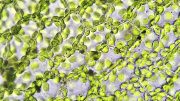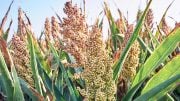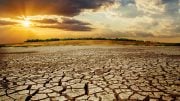
Elevated levels of CO2 make it difficult for plants to obtain the minerals necessary to grow and provide nutritious food.
Elevated CO2 levels cause mineral deficiency in plants resulting in less nutritious crops.
For years, one of the only possible bright sides of increasing levels of atmospheric carbon dioxide (CO2) seen by scientists is enhanced photosynthesis. After all, plants use carbon dioxide for photosynthesis, so it was expected that higher levels of the greenhouse gas will lead to more productive plants. However, this effect may be less than expected because elevated levels of CO2 make it difficult for plants to obtain the minerals necessary to grow and provide nutritious food. This is explained by scientists from the Institute for Plant Science of Montpellier in France in a review published on November 3 in the journal Trends in Plant Science.
“Two main nutrients that are essential for human nutrition may be affected by this phenomenon. The first one is proteins built from nitrogen. The second one is iron.” — Alain Gojon
“There are many reports in the literature showing that the CO2 levels expected at the end of the twenty-first century will lead to a lower concentration of nitrogen in most plants, mainly affecting the protein content in plant products,” says first author Alain Gojon. “It is very important to understand why growing plants at elevated CO2 has such a negative effect on the protein content of most staple crops and the future of food.” Gojon is the research director of France’s National Research Institute for Agriculture, Food and the Environment.
Plants use photosynthesis to incorporate CO2 into sugars that they derive their energy from. However, photosynthesis does not provide plants with the key minerals they need to grow. For most plants, these minerals, such as nitrogen, phosphorus, and iron, are picked up from the soil through their root systems. Nitrogen is particularly important as it is a key building block for the amino acids that plants use to make proteins.
Not only does a nitrogen deficiency mean that a plant will have difficulty building its tissues, but also that it will provide less nutrition to humans. “What is clear is that the nutrient composition of the main crops used worldwide, such as rice and wheat, is negatively impacted by the elevation of CO2. This will have a strong impact on food quality and global food security,” says corresponding author Antoine Martin, researcher of the French National Centre for Scientific Research.
“Two main nutrients that are essential for human nutrition may be affected by this phenomenon,” adds Gojon. “The first one is proteins built from nitrogen. In developing countries this can be a big issue, because many diets in these countries aren’t rich in proteins and plants grown at elevated CO2 can have twenty to thirty percent less protein. The second one is iron. Iron deficiency already affects an estimated 2 billion people worldwide.”
Beyond global food systems, the lowered mineral status of plants due to increased atmospheric CO2 levels may lead to a negative feedback loop for mitigating climate change. “The terrestrial carbon sink associated with enhanced photosynthesis may be limited if most of the vegetation is deficient in nitrogen and other minerals, which may prevent any additional increase of CO2 capture from the atmosphere,” says Gojon.
“We would like to really understand the mechanisms that are responsible for the negative effects of elevated CO2 on the mineral composition of plants,” says Martin. “For example, we are currently exploring the natural genetic variation behind these negative effects, that could be used afterward to improve crops nutritional value under future CO2 atmosphere.”
Reference: “The decline of plant mineral nutrition under rising CO2: physiological and molecular aspects of a bad deal” by Alain Gojon, Océane Cassan, Liên Bach, Laurence Lejay and Antoine Martin, 3 November 2022, Trends in Plant Science.
DOI: 10.1016/j.tplants.2022.09.002
This work was supported by the I-Site MUSE, the CNRS through the MITI interdisciplinary PRIME program, and the BAP department of INRAE.









This idea has been around for decades. However, because the food nutrients can be measured, then agronomists have the information necessary to alter the available plant nutrients, and if necessary, recommend changes in diet to compensate.
All dynamic systems appear to have optimum operating parameters. We have the means to determine those for edible plants. It shouldn’t be a surprise that if sunlight, water, CO2, phosphorus, or nitrogen are available in greater quantity, that one of the others may be restricting the optimal growth of a plant. A wise agronomist or farmer adjusts the essential parameter that is restricting optimal plant growth. Indeed, the Agricultural Revolution was the result of recognizing that fertilizers such as readily available nitrogen or phosphorus were usually the limiting factors in crop yield. Much ado about nothing.
Congrats, you’ve discovered https://en.wikipedia.org/wiki/Liebig%27s_law_of_the_minimum
You lying fool. Co2 IS plant food and essential for life.
So is water, does that mean floods don’t affect crop yeilds? 😐
Cows are fantastic at converting relatively low grade food (most vegetation) which is low in protein and high in in cheap calories such as starches, into very high grade food well suited to human omnivorous physiology. Just saying …..
Seriously, in the wealthier parts of the world, many of the vegetables that we eat are grown in hot houses where CO2 is deliberately concentrated at levels much higher than atmospheric. If it is good enough for us, then I am not going to worry much about them. I’d call this a red herring bordering on the dreaded “misinformation”.
Good to know! They have a good start at tagging the mechanic of it too, so that any tunnel or vertical farmers delighted to grow a crop in 1/4 the season with conc. CO2 from occupied buildings nearby can also try to make nutritious crops (by developing genetically altered seeds with improved chromophores, nitrogen fixation, nutrition adapted back in etc.; and/or other mechanism in root biota.)
Hmm, “May cause..” More Climate Change Non-Sense. Double the C02 levels to 800 PPM & plants grow twice as fast w/50% less water. More food,cleaner air,more oxygen,less erosion,++++.Love Si-Tevh Daily but 1st “Political Narrative Article I’ve seen.